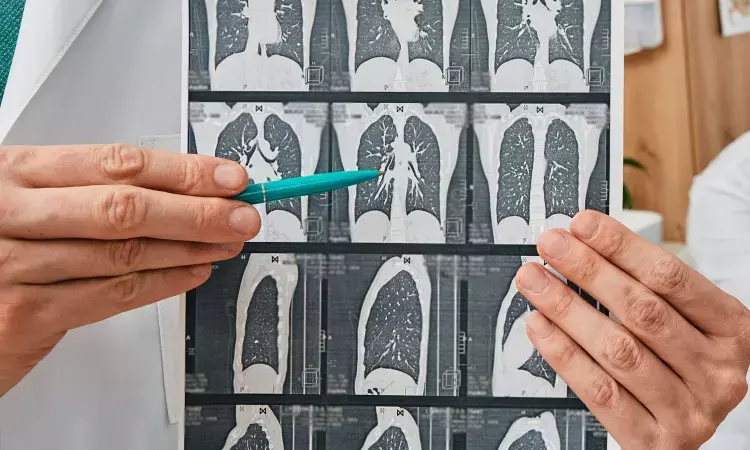- Home
- Medical news & Guidelines
- Anesthesiology
- Cardiology and CTVS
- Critical Care
- Dentistry
- Dermatology
- Diabetes and Endocrinology
- ENT
- Gastroenterology
- Medicine
- Nephrology
- Neurology
- Obstretics-Gynaecology
- Oncology
- Ophthalmology
- Orthopaedics
- Pediatrics-Neonatology
- Psychiatry
- Pulmonology
- Radiology
- Surgery
- Urology
- Laboratory Medicine
- Diet
- Nursing
- Paramedical
- Physiotherapy
- Health news
- Fact Check
- Bone Health Fact Check
- Brain Health Fact Check
- Cancer Related Fact Check
- Child Care Fact Check
- Dental and oral health fact check
- Diabetes and metabolic health fact check
- Diet and Nutrition Fact Check
- Eye and ENT Care Fact Check
- Fitness fact check
- Gut health fact check
- Heart health fact check
- Kidney health fact check
- Medical education fact check
- Men's health fact check
- Respiratory fact check
- Skin and hair care fact check
- Vaccine and Immunization fact check
- Women's health fact check
- AYUSH
- State News
- Andaman and Nicobar Islands
- Andhra Pradesh
- Arunachal Pradesh
- Assam
- Bihar
- Chandigarh
- Chattisgarh
- Dadra and Nagar Haveli
- Daman and Diu
- Delhi
- Goa
- Gujarat
- Haryana
- Himachal Pradesh
- Jammu & Kashmir
- Jharkhand
- Karnataka
- Kerala
- Ladakh
- Lakshadweep
- Madhya Pradesh
- Maharashtra
- Manipur
- Meghalaya
- Mizoram
- Nagaland
- Odisha
- Puducherry
- Punjab
- Rajasthan
- Sikkim
- Tamil Nadu
- Telangana
- Tripura
- Uttar Pradesh
- Uttrakhand
- West Bengal
- Medical Education
- Industry
AI may identify improper endotracheal tube position on chest radiographs allowing earlier repositioning

South Korea: Automated AI (artificial intelligence) identification of improper endotracheal tube (ETT) position on chest radiograph may allow earlier repositioning and thereby reduce complications, according to an accepted manuscript published in the American Journal of Roentgenology (AJR).
"AI identified improperly positioned ETTs on chest radiographs obtained after ETT insertion, as well as on chest radiographs obtained from patients in the ICU at two institutions," wrote corresponding author Eui Jin Hwang, MD, PhD, from the Department of Radiology at Korea’s Seoul National University Hospital.
Hwang et al.’s retrospective AJR study included 539 chest radiographs obtained immediately after ETT insertion from January 1, 2020, to March 31, 2020 in 505 patients (293 men, 212 women; mean age, 63 years) from institution A (sample A); 637 chest radiographs obtained from January 1, 2020, to January 3, 2020 in 304 patients (158 men, 147 women; mean age, 63 years) in the ICU (with or without an ETT) from institution A (sample B); and 546 chest radiographs obtained from January 1, 2020, to January 20, 2020, in 83 patients (54 men, 29 women; mean age, 70 years) in the ICU (with or without an ETT) from institution B (sample C). Lunit’s commercial DL-based AI system was used to identify ETT presence and measure ETT tip-to-carina distance (TCD). The reference standard for proper ETT position was TCD between 3 cm and 7 cm, determined by human readers. Critical ETT position was separately defined as ETT tip below the carina or TCD less than or equal to 1 cm.
Ultimately, in three patient samples from two different institutions, an AI system identified ETT presence with a sensitivity of 99.2–100%; and specificity of 94.5–98.7%, improper ETT position with a sensitivity of 72.5–83.7% and a specificity of 92.0–100%, and critical ETT position with a sensitivity of 100% in all samples and specificity of 96.7–100%.
Reference:
An JY, Hwang EJ, Nam G, Lee SH, Park CM, Goo JM, Choi YR. Artificial Intelligence for Assessment of Endotracheal Tube Position on Chest Radiographs: Validation in Patients From Two Institutions. AJR Am J Roentgenol. 2023 Sep 13. doi: 10.2214/AJR.23.29769.
Dr Kamal Kant Kohli-MBBS, DTCD- a chest specialist with more than 30 years of practice and a flair for writing clinical articles, Dr Kamal Kant Kohli joined Medical Dialogues as a Chief Editor of Medical News. Besides writing articles, as an editor, he proofreads and verifies all the medical content published on Medical Dialogues including those coming from journals, studies,medical conferences,guidelines etc. Email: drkohli@medicaldialogues.in. Contact no. 011-43720751


